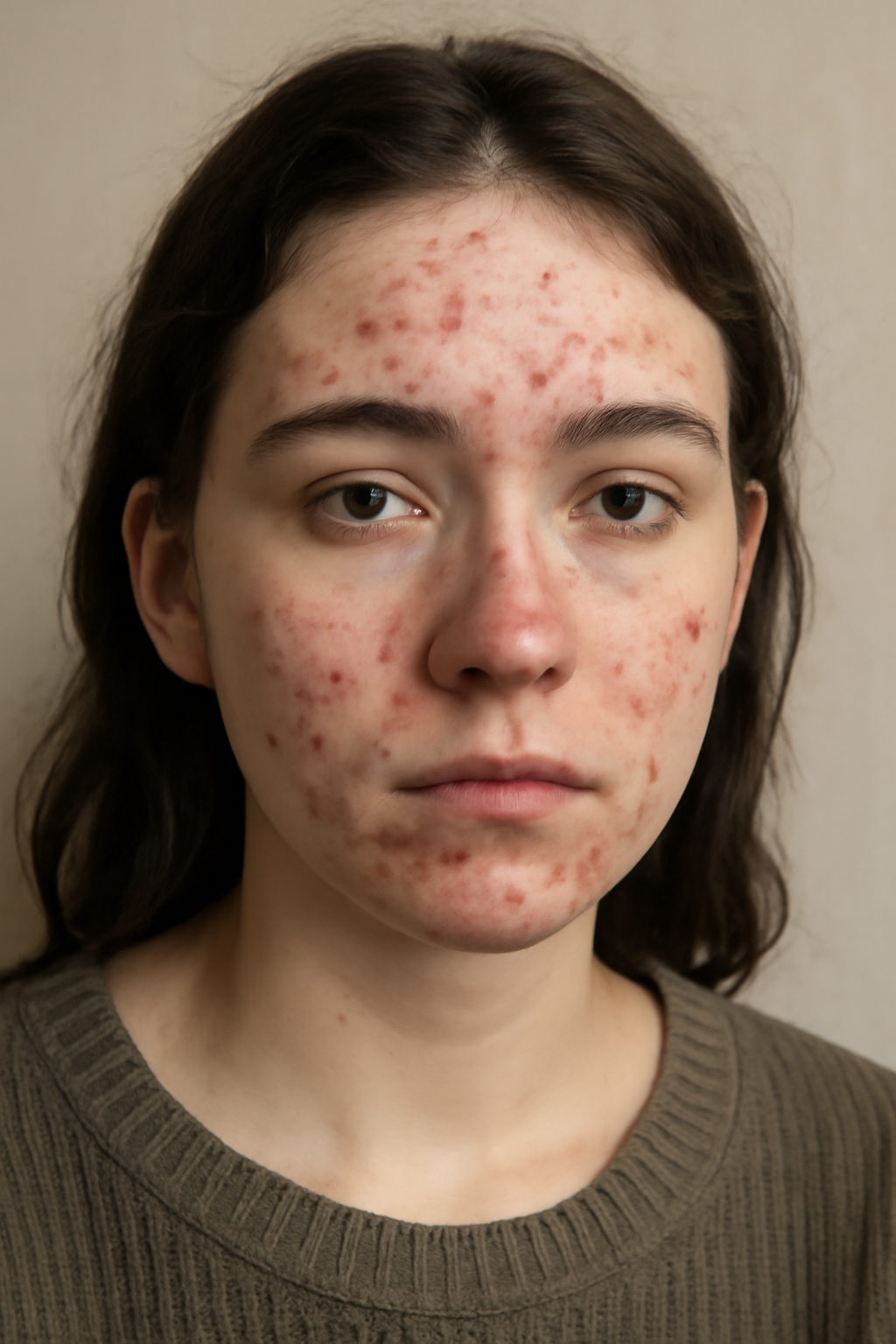Acne is a common skin condition that affects people of all ages, particularly teenagers and young adults. It occurs when hair follicles become clogged with oil, dead skin cells, and sometimes bacteria, leading to the development of pimples, blackheads, and cysts. While there are various treatments available, many people seek natural remedies for acne, as they tend to be gentler on the skin and have fewer side effects.
In this article, we will explore several natural treatments that can help reduce acne, improve skin health, and prevent future breakouts. From dietary changes to topical treatments, we’ll discuss proven, simple, and affordable ways to treat acne at home.
1. The Importance of Diet in Acne Treatment
Acne isn’t just caused by external factors like bacteria and oil buildup; internal factors such as diet, hormone fluctuations, and stress also play a significant role in its development. Maintaining a healthy diet can reduce inflammation, balance hormones, and regulate oil production, all of which can help prevent and treat acne.
Foods to Include:
- Leafy Greens: Vegetables like spinach, kale, and lettuce are rich in antioxidants, vitamins, and minerals that help reduce inflammation and improve overall skin health.
- Omega-3 Fatty Acids: Foods like salmon, chia seeds, flaxseeds, and walnuts are rich in omega-3 fatty acids, which have anti-inflammatory properties that can help reduce acne flare-ups.
- Zinc-Rich Foods: Zinc has been shown to reduce the severity of acne by decreasing inflammation and regulating oil production. Foods like pumpkin seeds, chickpeas, and lentils are great sources of zinc.
- Probiotic Foods: Fermented foods like yogurt, kefir, and sauerkraut contain beneficial bacteria that promote gut health, which can have a positive effect on your skin.
- Vitamin A-Rich Foods: Vitamin A plays a vital role in skin cell turnover and can help prevent clogged pores. Carrots, sweet potatoes, and eggs are excellent sources of vitamin A.
Foods to Avoid:
- Processed Foods: Diets high in sugar, refined grains, and unhealthy fats can increase inflammation and insulin levels, which can trigger acne. Try to limit your intake of sugary snacks, fast food, and processed carbohydrates.
- Dairy Products: Some studies suggest that dairy products, particularly milk, can exacerbate acne in some individuals. Consider reducing your intake of dairy and observe if your skin improves.
2. Hydration: Drink Plenty of Water
Water plays an essential role in maintaining healthy skin. Proper hydration helps flush toxins from the body, keeps skin cells hydrated, and supports the natural repair process of the skin. Drinking water regularly can help reduce the appearance of acne and keep your skin clear and glowing.
How Much Water Should You Drink?
Aim for at least 8 glasses (64 ounces) of water a day, but if you’re physically active or live in a hot climate, you may need more. Drinking water throughout the day helps prevent dehydration, which can lead to dry skin and worsen acne.
3. Aloe Vera: A Natural Acne Treatment
Aloe vera is a popular natural remedy for a variety of skin conditions, including acne. It has anti-inflammatory, antibacterial, and soothing properties that help calm irritated skin, reduce redness, and speed up the healing process of acne.
How to Use Aloe Vera for Acne:
- Fresh Aloe Vera Gel: Cut an aloe vera leaf and extract the gel from the inside. Apply the gel directly to the affected areas, leave it on for 20–30 minutes, and then rinse off with lukewarm water.
- Aloe Vera and Tea Tree Oil Mask: Mix a few drops of tea tree oil (which has antimicrobial properties) with aloe vera gel and apply it to your face. Leave it on for 15–20 minutes, then wash it off with water.
4. Tea Tree Oil: A Powerful Antibacterial Agent
Tea tree oil is one of the most popular essential oils used to treat acne due to its powerful antibacterial and anti-inflammatory properties. It helps kill acne-causing bacteria, reduce inflammation, and prevent clogged pores.
How to Use Tea Tree Oil for Acne:
- Dilute Tea Tree Oil: Since tea tree oil is potent, it’s important to dilute it with a carrier oil like coconut oil or jojoba oil. Mix 1–2 drops of tea tree oil with a tablespoon of carrier oil.
- Apply to Affected Areas: Use a cotton ball to apply the diluted oil to the acne-affected areas. Leave it on for a few hours or overnight, then rinse off with warm water.
5. Honey: A Natural Antibacterial and Moisturizer
Honey is a natural humectant, meaning it helps retain moisture, which is important for keeping your skin hydrated. It also has antibacterial and anti-inflammatory properties that can help prevent and treat acne.
How to Use Honey for Acne:
- Honey Mask: Apply a thin layer of raw honey directly to your face. Leave it on for about 15–20 minutes before rinsing it off with warm water.
- Honey and Cinnamon Mask: Mix 2 tablespoons of honey with a pinch of cinnamon and apply it to the affected areas. Leave it on for 15–20 minutes and rinse it off with water. Cinnamon has antimicrobial properties that complement honey’s antibacterial effects.
6. Green Tea: An Antioxidant-Rich Skin Soother
Green tea is packed with antioxidants, particularly polyphenols, that help fight free radicals and reduce inflammation. Drinking green tea can help regulate insulin levels, which in turn can reduce acne flare-ups. Additionally, the topical application of green tea extract can help soothe acne-prone skin and reduce redness.
How to Use Green Tea for Acne:
- Green Tea Toner: Brew a cup of green tea, let it cool, and transfer it into a spray bottle. Use it as a toner by spritzing it on your face after cleansing.
- Green Tea and Honey Mask: Mix green tea with honey to form a paste. Apply this mixture to your face, leave it on for 15–20 minutes, and then rinse with warm water.
7. Apple Cider Vinegar: Balancing the Skin’s pH
Apple cider vinegar (ACV) is a popular natural remedy for acne due to its ability to balance the pH of the skin. It has antibacterial properties that help kill acne-causing bacteria, while also reducing the production of excess oil, which can lead to clogged pores.
How to Use Apple Cider Vinegar for Acne:
- ACV Toner: Mix 1 part apple cider vinegar with 3 parts water. Use a cotton ball to apply this mixture to your face as a toner after cleansing.
- ACV Spot Treatment: If you have specific blemishes, apply a diluted solution of ACV directly to the affected areas using a cotton swab. Leave it on for 5–10 minutes before rinsing it off.
8. Witch Hazel: A Natural Astringent
Witch hazel is a natural astringent that helps tighten the skin and reduce oil production, which can help prevent acne. It also has anti-inflammatory and antibacterial properties that can help soothe irritated skin and reduce acne breakouts.
How to Use Witch Hazel for Acne:
- Witch Hazel Toner: Apply witch hazel to a cotton ball and swipe it over your face after cleansing. This will help remove excess oil and bacteria.
- Witch Hazel and Aloe Vera: Combine witch hazel with aloe vera gel for a soothing, acne-fighting treatment.
9. The Power of Exfoliation
Exfoliating the skin helps remove dead skin cells that can clog pores and contribute to acne. While it’s important to exfoliate regularly, over-exfoliating can irritate the skin and worsen acne, so be gentle.
Natural Exfoliants:
- Sugar Scrub: Mix sugar with honey or olive oil to create a natural scrub. Gently massage it onto your face in circular motions, then rinse with warm water.
- Baking Soda Scrub: Mix baking soda with water to create a paste. Use it to exfoliate your skin by gently massaging it in a circular motion.
10. Lifestyle Changes to Prevent Acne
While natural remedies can help treat acne, making lifestyle changes can further support clear skin.
Manage Stress:
Stress triggers the release of hormones like cortisol, which can increase oil production and contribute to acne. Practices like yoga, meditation, and deep breathing exercises can help manage stress.
Get Enough Sleep:
Sleep is essential for overall health, including skin health. Aim for 7–8 hours of sleep per night to allow your body to repair and regenerate, keeping your skin healthy.
Avoid Touching Your Face:
Touching your face can transfer bacteria and oil from your hands to your skin, increasing the risk of acne. Try to avoid resting your face on your hands and ensure that your pillowcase is clean.
Acne is a frustrating and common skin condition, but with the right natural treatments and lifestyle changes, you can significantly reduce breakouts and improve your skin’s appearance. From dietary changes to topical treatments using honey, aloe vera, tea tree oil, and green tea, there are many effective, affordable, and natural remedies you can try at home.
Remember that consistency is key when it comes to acne treatment. While natural remedies may take time to show results, they can be gentler on the skin than harsh chemical treatments. If your acne persists or worsens, it’s important to consult with a dermatologist for further guidance.
By making these natural remedies a part of your skincare routine, along with a healthy lifestyle, you can achieve clearer, healthier skin over time.
Ask ChatGPTTools




